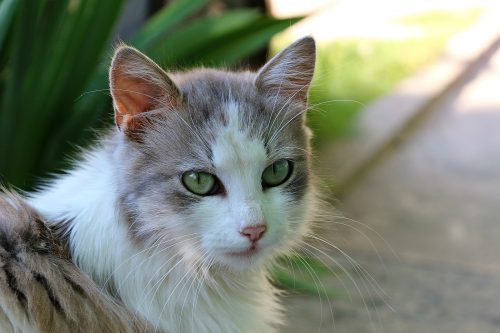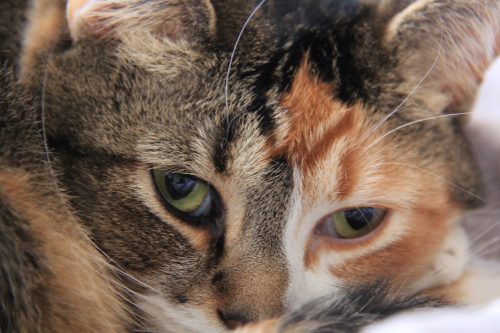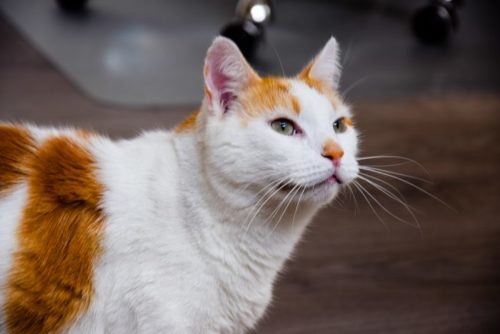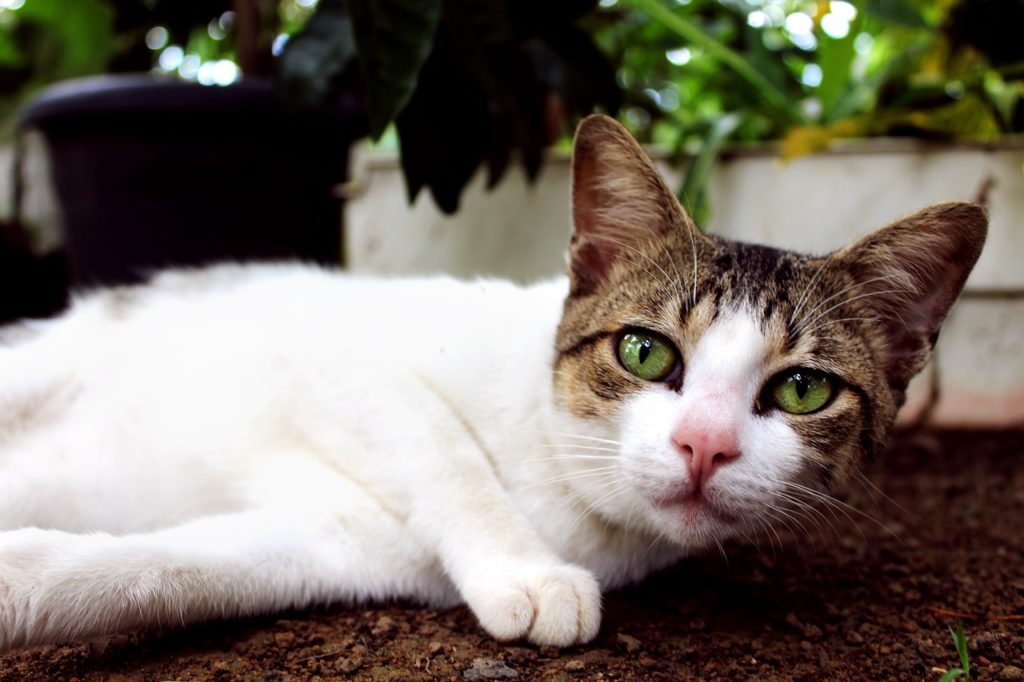Vomiting in cats is not a minor symptom. Although cat vomit can be harmless in some instances such as the digestive tract’s inability to process a foreign substance, or cat hairballs getting stuck in their throat, it could also mean your cat’s health is in serious risk. In fact, if their condition worsens or becomes chronic, they are at high risk of becoming dehydrated or having normal body functions compromised.
If your cat is vomiting and you do not know what’s causing your cat to become sick and their issue only worsens, it’s time for medical attention.
This article will cover everything you need to know about what causes cats to vomit and when it’s time to seek professional help. The better you are prepared for this kind of situation, the faster you will be able to treat your furry companion. By educating yourself and keeping a close eye on your cat’s health, you will be able to be an informed and dependable pet owner throughout your cat’s life.
The most important thing you can do is to try to identify the cause of his issue. If it is apparent that they consumed too quickly or is caused by a minor complication, it usually means they will be okay. On the other hand, if you assume your cat might have consumed a poisonous substance or his vomiting is accompanied by other symptoms, it is highly advised to seek professional help.
Why is My Cat Vomiting?
Cat’s vomit by forcefully ejecting substances from the stomach through the mouth. Feline vomiting normally occurs because the contents inside the stomach are causing them some type of discomfort. When a cat vomits, their stomach muscles begin to contract, allowing them to expel whatever is upsetting them. In some cases, cat vomiting can also be caused by an underlying health issue, which will be covered in a later section.
Main Causes of Cat Vomiting
Cat Hairballs
Hairballs are unpleasant for both the cat and the owner that has to clean it up. If the hairball is large enough, it can cause internal blockages, leading to vomiting and other complications. For those of you who don’t know, hairballs are actually the result of your pet’s grooming habits. When they do their daily licking and grooming, they take in loose hairs through their sandpaper-like tongue. Since they are unable to spit the hair out, they swallow it and it gets stuck in the stomach. After a while, the hair will build-up, causing a hairball to form.
Aside from vomiting, a cat may show other symptoms such as a lack of appetite, lethargy, constipation, and diarrhea. If your cat is showing these symptoms and has a history of having hairballs, ask your veterinarian for a hairball product that will help them pass their obstruction. It is also highly advised to step up your brushing game, for this is an easy way to rid your cat’s coat of loose and dead hair that normally cause hairballs to occur. If their issue is severe, you can even change their diet to a specialized hairball formula that should help to mitigate the issue.
Switching To a New Food
Cats are known to be finicky eaters in general. Finding the right food that they like and one that’s also good for their bodies can be a challenge. Sometimes when you try changing to a new cat food product, your cat will become sick. Vomiting can even occur if your cat is on a dry food diet and you switch him to a wet food diet or vice versa. If your vet has recommended a new product and your cat is getting sick from it, try slowly adding it to their diet by mixing in their old food as well. If your cat is showing other symptoms including vomiting or diarrhea, talk to your veterinarian for professional assistance.
Eating too Quickly
Some cats see food and rush to scarf the whole thing down. If this is the case for your furry feline, that might be what’s causing him to vomit right after. When a cat eats too quickly, food can rub against the lower part of the esophagus, causing them to regurgitate everything they had just consumed.
If you have multiple cats within your household and one of them is always stealing the other cat’s food, this can also cause your cat to get sick as well. If this is occurring in your household, try to feed the cats in different areas of the home so that they can all enjoy their meal in peace. Once you have given all the cats about 20 minutes to consume their food, take away all the bowls so your hungry kitty doesn’t go looking for leftovers.
Quality of diet
Just like humans, a cat’s diet should be rich in vitamins and nutrients to stay healthy. If they’re being fed a diet that contains empty calories and low-quality ingredients, this could be the culprit of your cat’s vomiting problem. Both kittens and cats can also develop food allergies due to their dietary consumption. This is especially true if you have recently tried feeding him a new diet or given him treats that he has never tried before.
Even healthy cats can develop food allergies at any point in their life. Your cat can even develop allergies if he is continuously fed over and over the same exact food every day of his life. If your cat begins to vomit after meals, it could mean that something in his diet is affecting him. In order to uncover the source of his issue, take him to the vet for a thorough examination.
Eating Grass or Other Household Plants
Did you know that it’s quite normal for cats to eat grass? In fact, a little grass consumption can actually help get rid of any hair that has been swallowed during grooming. Problems can arise however if your cat has consumed too much or if there are chemicals like pesticides in the plants. It is also important to know that some household plants are actually poisonous to cats, which will obviously lead to vomiting. There is a long list of plants that can affect your furry friend, so make sure you do your research on which ones are safe before bringing one into the home.
Other Possible Health Concerns that Cause Vomiting in Cats
In the unfortunate case that your cat’s vomiting problem is not any of the causes listed above, it could be due to a more serious health issue. The possible health issues that cause vomiting in cats can range in severity, and some require more medical attention than others. If your cat seems as though they may be suffering from an internal issue, that is when you should seek help from a veterinarian. Although not all health issues lead to a life or death situation, it is still recommended to get your cat checked out and treated as soon as possible.
Possible health issues that may be causing your cat to vomited can include:
- Parasites
- Ingesting poison
- Gastrointestinal foreign bodies
- Viral infections
- Reaction to certain medications
Chronic vomiting may be a sign of these health conditions below:
- Gastritis
- Heartworm infection
- Pancreatitis
- Colitis
- Intestinal obstruction
- Kidney failure
- Liver failure
- Neurological disorders
- Severe constipation
- Intestinal tumors
When It’s Time to See a Vet
Although not all cat vomiting should cause you to run to the vet, there are several symptoms to look out for that deem a visit. If your cat is experiencing symptoms that are out of the ordinary or completely different than their normal behavior, that means they are probably suffering from something more.
- If they are vomiting blood
- If they appear to be in pain
- If their gums are yellow or pale in color
- If you suspect that they have consumed something poisonous
- If they attempt and are unable to induce vomiting
- If they have a fever
- If they have a swollen abdomen
Unfortunately, if your cat is suffering from one or more of these symptoms above, a serious problem has his life in danger. Before you are able to get him to the vet, do not try and give him any medications until you have talked to a professional. Try to make your cat as comfortable as possible and provide him with a bowl of freshwater to keep him hydrated. Once you are at the vet, they will ask you a series of questions regarding your cat’s overall health and symptoms. Make sure to provide them with as much information as possible which will help to identify the underlying cause.
How to Treat Vomiting in Cats
As soon as your cat vomits for the first time, withhold his food for 24 hours and monitor your cat’s behavior. Make sure to continue feeding him water throughout the duration of this period. Do not try to reintroduce food too quickly for this can cause vomiting to occur once again. In order to prevent your cat from getting sick, try feeding him bland food such as rice or boiled potatoes. If your cat seems to be adjusting well, you can then try and reintroduce his normal diet. If he is allergic to a particular ingredient, they may need to have a complete change in diet.
If the vomiting is caused by bacteria, your cat will need to be tested by a veterinarian. From there, the vet will be able to diagnose the issue and prescribe an antibiotic for your kitty. If the intestines have been damaged in any way due to the excessive vomiting, your vet may also prescribe an antibiotic to prevent bad bacteria from forming in the intestinal tract. Other medications can also be used if the cat’s vomiting is consistent. Normally in this situation, if a cat has become dehydrated, he may also need intravenous fluids.
For cats that are suffering from intestinal worms, a vet will first need to run a series of tests to identify the issue. Once the type of worm has been properly identified, the vet will then prescribe the proper worming treatment plan. It is critical that you follow the treatment plan throughout the entire duration that your vet prescribes. In some cases, the worming treatment may have to be used a second time if the cat is still infected. You will need to take your cat to the vet for periodic examinations to ensure that they have been completely cured in the following months.
If your cat is suffering from a more serious condition, your vet will need to do further testing specific to those issues. Depending on your cat’s problem, he may need an extensive treatment plan to help him get back to normal. The best thing you can do as his owner is to take him to the vet at the very onset of symptoms and follow all instructions as closely as possible.
If your cat is suffering from vomiting, do not begin to panic. Vomiting is normal behavior and should not raise major concern the very first time it happens. However with that being said, if your cat is suffering from continuous vomiting, has accompanying symptoms that are also present, or is thought to have consumed something toxic, take him to the vet right away.
You would rather be proactive and seek treatment even if it’s not necessary instead of letting the issue pass without concern and then have your cat in deep trouble. By remembering this information above and being aware of your cat’s overall health, you will be able to keep your cat as healthy as possible for years to come.
Sources:
- “Vomiting Cat – Normal or a Concern?” Vetwest Animal Hospitals, 27 Nov. 2014, Accessed 24 Feb. 2018. www.vetwest.com.au/pet-library/vomiting-cat-normal-or-a-concern.
- “Vomiting in Cats.” Cat Health, Accessed 24 Feb. 2018. www.cathealth.com/cat-health/digestive-system/1208-cat-vomit.
- “Vomiting in Cats.” PetMD, Accessed 24 Feb. 2018. www.petmd.com/cat/emergency/common-emergencies/e_ct_vomiting.
- “Vomiting in Cats.” PetCoach,
- Accessed 24 Feb. 2018.www.petcoach.co/article/vomiting-in-cats/
- “Cat Vomiting: How To Tell If It’s Serious.” Honest Paws, 17 Sept. 2018, Accessed 24 Feb. 2018. www.honestpaws.com/blogs/pet-care/cat-vomiting.




